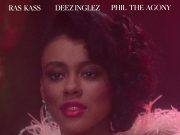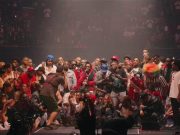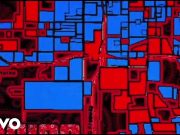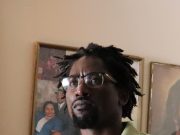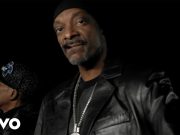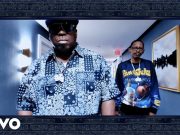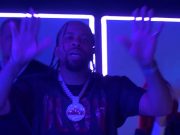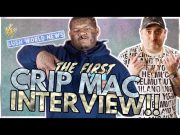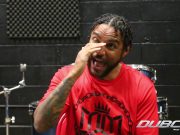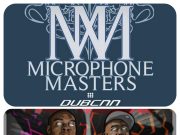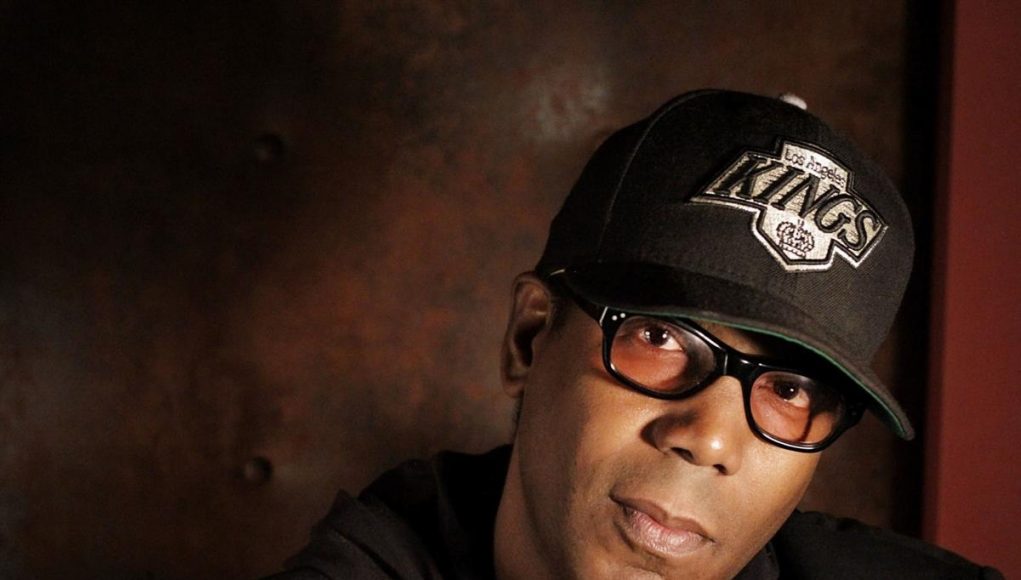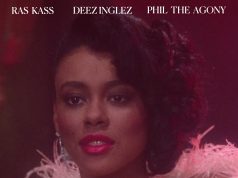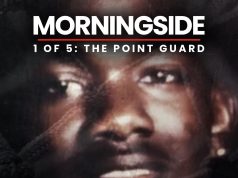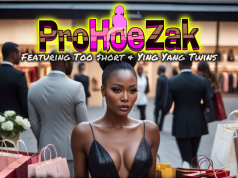From N.W.A’s 100 Miles and Runnin’ to The Chronic music producer Colin Wolfe was Dr. Dre’s right-hand man, lacing songs like “Fuck The Police Pt. 2”, “Real Niggaz Don’t Die”, “Deep Cover”, and “Fuck Wit Dre Day (And Everybody’s Celebrating)” with innovative grooves and sounds never before heard in gangsta rap, much less hip-hop itself.
Colin Wolfe provided a sonic blueprint for Dr. Dre’s ground-breaking G-Funk production, helping to usher in a laid-back, Parliament/Funkadelic-inspired, variation of gangsta rap in the early ’90s. With slow, funky grooves and deep, syrupy bass Colin Wolfe was instrumental in establishing G-Funk as the most popular genre of hip-hop in the early ’90s, and even to this day.
In the following years since those early beginnings on the west coast, the music producer continued to work with some of the music industry’s most elite artists and producers like Michael Jackson, Madonna, Janet Jackson, George Clinton, 2Pac, Dallas Austin, TLC, Monica, Too Short, and MC Breed to name a few.
In this exclusive interview with Chad Kiser for DubCNN, Colin Wolfe discusses his work with N.W.A on the 100 Miles and Runnin EP and Efil4zaggiN, details his working relationship with Dr. Dre during the making of “Deep Cover” and The Chronic, crafting the classic 2Pac & MC Breed record “Gotta Get Mine” with Warren G, working and clowning with the “King of Pop” Michael Jackson and so much more!
Colin Wolfe: A DubCNN Exclusive Interview
Questions Asked By: Chad Kiser
…………………………………………………………………………………
DubCNN.com: Tell me about connecting with N.W.A and the first project you worked on with the group.
A guy had hired me to play bass at this place called the China Club which was a spot up in Hollywood. Just as I was playing the bass solo, in comes the whole Ruthless camp, Jerry Heller, Eazy-E, Dr. Dre, L.A. Dre because their artist Jimmy Z was coming on after me. They had come up there to support him. They were just starting to put together Michel’le’s band for touring and it was right place, right time. From that point on, I just linked up with Dre and was in the studio all the time. The first N.W.A track that I played on was “Fuck The Police Pt. 2” which was on the 100 Miles and Running EP. What’s funny is that I wasn’t even into rap at the time. I’m a musician so I’m listening to people like Stanley Clarke, Jaco Pastorious and the Funk and Jazz stuff. It wasn’t until I started working with them that I started listening to rap music.
DubCNN.com: You started working Dr. Dre and N.W.A on the heels of Ice Cube leaving the group, what was the studio atmosphere and process like during those sessions?
It was nothing like what people would imagine! But for the most part it would just be me, Dre, and Yella there. Yella would usually be there first working on stuff and then me and Dre would come in a little later. Throughout the day The D.O.C. might stop in, MC Ren might stop in, LayLaw and a few other people. We did all the engineering ourselves. Dr. Dre taught me how to line up the tape machine, put tape on, cut the tape and all kind of things. The sessions were mellow, no drama no nothing. We weren’t even smoking in the studio, but we’d have some drinks later on in the day! But for the most part we were there just creating.
As far as the recording or writing process, I was the one who recorded Dre’s vocals! I had good timing and was able to punch him in pretty good. If D.O.C. was writing something for Dre or Eazy we’d give him an instrumental and D.O.C. would take it to the crib and vibe off on it. Then he’d come in the next day with some fire! And that was pretty much the same with all of them. We would give them the instrumental and they’d come back the next day with some heat. Usually, if it was a rap, either The D.O.C. or Kokane wrote Eazy’s verses. Dr. Dre did write “Automobile” for Eazy, though, and The D.O.C. wrote the majority of Dre’s verses on Niggaz4Life.
DubCNN.com: With N.W.A’s 1990 release Efil4zaggin you played on every track except for one. I can’t really pick just one or two songs to discuss with you because that’s one of those albums to me where each song is dope. Is there a particular song that stands out to you that you worked on for that project, and the process?
Of course I’m going to have to point out “Real Niggaz Don’t Die” because that was the first one I got writing credit on. When I came in, Dr. Dre had played me what he had so far, and he needed a bassline to go with it. I just played the first thought I had and it just worked. Back then stuff like that was easy for me because I would hear stuff right away. I used the Yamaha BB2000 to lay it down and then Mike Sims played guitar over top of it.
DubCNN.com: I read another interview on you and you mentioned Eazy-E’s unreleased album Temporary Insanity. How far into recording that project did you and Dr. Dre get with Eazy-E?
It was at the very beginning stages with a few ideas down, but for the most part it was mainly just concepts. I don’t remember us getting that deep into it. There might have been one or two songs recorded, but almost immediately after we finished the Niggaz4Life album Dr. Dre was out. We never went back to the studio after that.
DubCNN.com: Moving onto the Death Row era, discuss the making of the first released song from the new label, “Deep Cover”?
We were about halfway done with the Chronic album and then the Deep Cover soundtrack came up, so we put the Chronic album on pause for a minute to work on that. That was an opportunity for us to make some money because we hadn’t made anything yet since the split from Ruthless. It was the last day we had to complete the song, first of all, because the rest of the soundtrack was done. We just had to make the title track. We were vibing in the studio at the house, and they put on that little Sly Stone loop, I came up with the bass line, and Snoop came up with his part. We took the tape to the Solar studio the next day and mixed it. We were listening to a lot of A Tribe Called Quest back then, I remember thinking how dope they were. They had Ron Carter on the bass and he was playing all those little Jazz lines, but they were funky as hell. I was trying to think of a way to incorporate that into what we were doing. We always liked to do stuff that sounded out there, and that’s when I came up with the tritone.
DubCNN.com: What were those early recording sessions at Death Row like with Dr. Dre, Snoop, Kurupt, Daz and everybody during the making of The Chronic?
It was dope! You have to remember, they were hungry at this time. We had all these other rappers there as well, he had D.O.C. mentoring him, and they all was just trying to outdo each other. It made for a dope, creative atmosphere. You had Kurupt there, Daz, Warren G, RBX, Lady of Rage and everybody just collaborating and listening to each other, vibing off of each other. You can hear in the music how much fun we had in the studio. We would have barbecues at the house and invite people over to hear the tracks we were making and watch their reactions to it. We did our own style of urban marketing, I guess you could say. Every time we played “Nuthin’ But A G Thang” it was the same reaction. We knew we were going to put that one out first, it was a no-brainer.
DubCNN.com: Was it discussed going into the making of The Chronic to have the Parliament Funkadelic sound as the backbone of the overall record, or did it just happen to be geared that way?
No, me and Dre talked about it. I remember me and Dr. Dre were in the car leaving the studio talking about how we needed to do some crazy Parliament Funkadelic type of shit for this next record. We had the Moog in place, so we put that piece to work and just made it happen.
DubCNN.com: You obviously had the Moog working in a lot of The Chronic songs, but what were some other vital pieces of equipment you used to lay most of the bass lines down with?
Well, for “Dre Day” and “Deeez Nuts” it was the Moog, while on “Let Me Ride” and “Nuthin’ But A G Thang” I had the Yamaha BB2000, and I had it all tricked out with these special brass nuts and stuff like that. On “Deep Cover” that was done with a bass called the Clevinger Jr. Clevinger is an electric upright, so it would stand up like an upright. With the Clevinger Jr you would strap it on like a bass, but it was still a fretless bass as well. The only time we used that bass was on “Deep Cover”.
DubCNN.com: Can you break down a couple of the tracks you did on The Chronic as far the samples and stories behind them, and how you and Dre produced them? Like with “Dre Day” you worked with the Moog, but what else went into the making of that one?
With Dre Day, like I said, I created that one on the Moog. They had the beat going and that bassline was the first thing that came to mind. I’m trying to think about in the Parliament Funkadelic world of what kind of scales are they using. Keeping it sinister sounding. “Let Me Ride” is basically just a remake of that old classic Parliament Funkadelic song. Both of those records were just in that world of Parliament Funkadelic. With “Bitches Ain’t Shit” they would just give me a drum beat and I just hit record and would come with it. As far as me, there wasn’t a whole lot of thought process in what I was doing because once I heard a dope beat I just put a funky bass line to go with them.
DubCNN.com: Both Efil4zaggiN and The Chronic relied heavily elements from the Parliament Funkadelic sound, yet they were completely different from each other. Compare those two iconic records against each other as far as how you and Dr. Dre constructed both of those projects musically.
On Niggaz4Life we actually replayed some of the Parliament Funkadelic stuff, as opposed to The Chronic album where I using my influences based off of listening to their stuff. If you listen to the Niggaz4Life to The Chronic, it was a natural progression to dive even further into that sound, but more laid back on The Chronic and not as hyped up as the Niggaz4Life project. N.W.A was high energy and hyped up, but The Chronic was laid back.
DubCNN.com: From 100 Miles and Runnin’ through The Chronic, you and Dr. Dre really had an undeniable chemistry. Talk to me about working with Dr. Dre, and if you think you two will ever work together again.
I would hope that we would because he knows what it takes to get me going, and that’s just giving me a funky beat [laughs]. Just give me a funky beat and let me do what I do.
DubCNN.com: After working on The Chronic you kind of disappeared from the Death Row scene.
I had moved to Atlanta to work on The New Breed album with Warren G and MC Breed, and I just didn’t come back. I stayed out there for seven years, hooked up with Dallas Austin and worked on Rowdy Records stuff like Illegal and Monica, as well as worked with Madonna, Michael Jackson, and just a gang of records back then. Right when we finished the Chronic album, things started getting a little dicey. Suge Knight and his street ethics were coming into the studio and it just wasn’t a safe environment to be around.
DubCNN.com: Tell me about putting together the MC Breed and 2Pac record “Gotta Get Mine” for The New Breed.
When Warren G came to me he only had was the drum beat and guitar sample. He asked me to help him with the record, and as soon as I heard it that’s what I came up with, so I put the music around it. I went back to Atlanta with them to help finish up the whole album, as well as I mixed and engineered the entire album. The D.O.C. mentored MC Breed on the record, and everything 2Pac did was basically freestyled. We just put ‘Pac in the vocal booth and let him to what he do, just hit record. That’s all you had to do with him [laughs]. You could feel the energy coming out of the booth when he was in there.
DubCNN.com: While you were in Atlanta you also hooked up with Too Short and produced 3 tracks on Gettin It (Album #10), “Take My Bitch”, “Nasty Rhymes”, and “So Whatcha Sayin”; as well as “All About It” from the Short Records compilation Nationwide: Independence Day. How did you connect with Too Short?
MC Breed was a big part in putting us together. The funny thing is that Short was living in a place called Oakland, but in Atlanta. And his recording studio was there as well, Oakland City Studios. I went up to the studio and was up there for like two days straight just laying a bunch of tracks down. He called me up about a month later saying, “We got a check for you. We recorded on some of your tracks.” Shorty B was around, Erick Sermon was in town, and it was similar to his set up out here where he’d have a studio and people would just be up there working all the time and he would come through. He’s always dug real music and real musicians, and I got made respect for him.
DubCNN.com: Fellow producer Chris “The Glove” Taylor has mentioned that “Xxplosive” from Dr. Dre’s 2001 was initially intended as a song for King T’s project on Aftermath.
Yes, “Xxplosive” was originally recorded for King T’s Aftermath record out in Reno, Nevada at a studio called Grandma’s House. Me and the guitar player stood side by side and recorded that record from top to bottom, like on some first take shit. We had done a whole slew of records for him out in Reno, but none of them ever came out. King T recorded a song to it, but then the next thing I know it’s on Dre’s album with different people on it. But it was for King T’s record because that’s why we were all out there in Reno was to produce King T’s album. We would make instrumentals and King T would go upstairs to start writing to it, while we were downstairs coming up with more tracks for him to write to.
DubCNN.com: Switching gears a little bit, how did you connect with Madonna for her Bedtime Stories album for the songs “Don’t Stop” and “Honesty”?
Through Dallas Austin. He was slated to work with her, and I was his right hand man at the time so I was in the studio with them. While we working in the studio, Dallas looked over at me at one point and asked what I could come up with. So, I came up with a couple of concepts for her, too. For the most part, I was there with him laying down bass lines and whatnot. But I had an opportunity to do some writing as well. Madonna is mad cool! As we were developing tracks that she liked, she’d have a book of poems that she would look through to try and find something that would fit the track. If not, she would often just go from scratch, too, and by the time we’d be done with the track she’d be done with the lyrics to it. I’d get up and go jogging with her before we hit the studio, and then we’d go to the studio and vibe out.
DubCNN.com: Was this around the time she was hanging around with 2Pac?
[Laughs] No, she was hanging out with Dennis Rodman at the time! He came out a couple of times and hung out with us. Not in the studio, but we’d hang out and different clubs and parties.
DubCNN.com: You also worked with another music legend in Michael Jackson on a song called “This Time Around”.
Yes! That was cool because Michael had called Dallas Austin to work on some tracks for him. Dallas would do the tracks in Atlanta, and Mike would pick whichever ones he wanted. We’d come out to L.A. to re-record it and Mike would have like four studios booked up, but we were at the one he was at which was Record One. Coincidentally, Dr. Dre now owns Record One. We were in one room messing with tracks, and Mike would be in another room doing vocals. Mike was mad cool, too. One day I was sitting in the kitchen eating some lunch, and Mike was walking by. He’d never just walk by you, he stopped and asked me how I was doing and stuff like that. We’d converse for a little just about normal stuff. He was a prankster, too! He lit a tear gas gun in the studio one day [laughs]. He was trying to show us how he accidentally did it somewhere else, but then he accidentally did it again in showing us [laughs]. He cleared the whole studio out! We had to leave for the day [laughs].
I think I got like $12,000 to play on that song because every day they kept me out here they had to pay me. So it just racked up to that amount. I recorded the bass line, and then I recorded the bass line from the top just in case he wanted it from the top because when I did it in Atlanta I waited eight bars and then I came in. When we came back to L.A. I recorded it from the top just in case. I’m working with Bruce Swedien now at Larrabee North, and he’s telling me to call Mike to see if he wants me to play it just like I did in Atlanta. I’m like, “I did, I just played it at the top. Just mute it if you don’t want it at the top.” [Laughs] He’s like, “nope, you have to do it just like you did in Atlanta.” I’m like, “I did, just mute it!” So I just waited eight bars and did it just like I did before. [Laughs] But it was cool.
DubCNN.com: So working with Michael Jackson was an interesting experience
Yeah, and even for lunch or dinner the runner would go get whatever we would think of. Whatever it was! So, of course, a lot of the days it was Roscoe’s [laughs]. We’d be in the valley, so they’d have to go all the way over to Hollywood to bring us some Roscoe’s. Mike wouldn’t eat Roscoe’s, but he’d eat a lot of sushi. Always salmon, a gang of salmon with a gang of soy sauce and wasabi. He’d have the soy sauce looking like mud because he’d have so much wasabi in it!
Colin Wolfe was speaking to Chad Kiser, exclusively for DubCNN.com. Copyright 2018.

